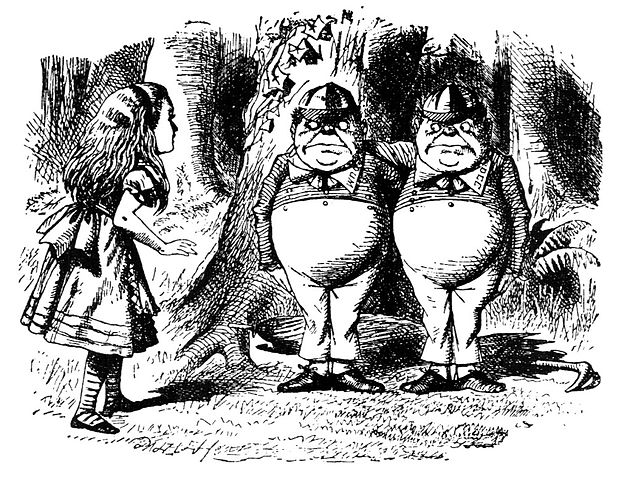Chapter 2 A Little Bit of Logic

John Tenniel, “Alice meets Tweedle Dee and Tweedle Dum”
‘Contrariwise,’ continued Tweedledee, ‘if it was so, it might be; and if it were so, it would be; but as it isn’t, it ain’t. That’s logic.’
—Lewis Carroll, Through the Looking Glass
Logic is the formal study of reasoning – the attempt to justify or provide evidence for claims or beliefs. In this chapter we will look at the basic concepts and techniques for the logical analysis of arguments. As we will be seeing this will be useful in our discussions of ethics since much of what we will be doing will involve careful consideration of the justification of claims we make about ethics in general as well as particular topics in ethics.
Before we get started though we need to clarify some terminology – especially our use of the word “argument.” Too often this word conjures up a pointless verbal fight between people with opposed views. They argue rather than discuss because their differences of opinion are fixed in place and neither will budge. It is typically a good idea to stay away from arguments in this sense. The word argument as we are using it here, however, has quite a different meaning. For us arguments do not require differences of opinion because arguments are just attempts to explicitly provide back-up or justification for some claim that we might make. We offer arguments in this sense whenever we make the grounds for our belief explicit whether we are doing this within the confines of our own heads, in written form or spoken out loud, and whether or not anyone disagrees with us. Arguments in this sense of the term might appear in regular old verbal disputes. But as we will be seeing, arguments are best looked at one at a time since each one stands or falls on its own merits.
So, for philosophers, arguments are just attempts to provide support for whatever it is that we might claim is true. For example, maybe we think the death penalty is wrong, or the opposite, so we come up with an argument to show this. Or maybe we think that morality is a sham, nothing but a cover story for basically selfish motives. Once again, we can come up with an argument in support of this idea. Or on an even more abstract level we might think that moral judgments are just matters of opinion and that it is therefore a waste of time to even argue about what is right and what is wrong. Since none of these claims are self-evidently true (even though some people may think some of these are obvious) we’ll need an argument to back them up, or at least to make explicit our reasons for making these claims. In the end, we can think whatever we want. That will, however, only get us so far – either others will agree with us or not, and either our thoughts will be true or not. But we can also offer reasons in support of our claims in the form of arguments. As we will be seeing, not all arguments are equally persuasive. There are, however, clear-cut and reliable ways of evaluating them to see which really provide the support we are after and which do not.